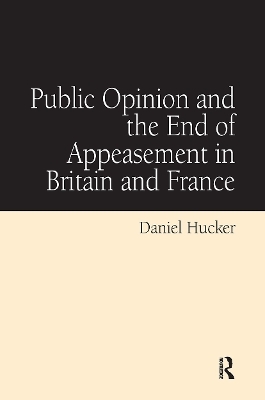
Public Opinion and the End of Appeasement in Britain and France
Seiten
2024
Routledge (Verlag)
978-1-032-92285-0 (ISBN)
Routledge (Verlag)
978-1-032-92285-0 (ISBN)
The 1930s policy of appeasement is still fiercely debated more than 70 years after the signing of the 1938 Munich Agreement. Less examined is the role of public opinion on the formation of British and French policy in the period between Munich and World War II. Public Opinion and the End of Appeasement in Britain and France is essential reading for
The 1930s policy of appeasement is still fiercely debated by historians, critics and contemporary political commentators, more than 70 years after the signing of the 1938 Munich Agreement. What is less well-understood, however, is the role of public opinion on the formation of British and French policy in the period between Munich and the outbreak of the Second World War; not necessarily what public opinion was but how it was perceived to be by those in power and how this contributed to the policymaking process. It therefore fills a considerable gap in an otherwise vast literature, seeking to ascertain the extent to which public opinion can be said to have influenced the direction of foreign policy in a crucial juncture of British and French diplomatic history. Employing an innovative and unique methodological framework, the author distinguishes between two categories of representation: firstly, 'reactive' representations of opinion, the immediate and spontaneous reactions of the public to circumstances and events as they occur; and secondly, 'residual' representations, which can be defined as the remnants of previous memories and experiences, the more general tendencies of opinion considered characteristic of previous years, even previous decades. It is argued that the French government of Édouard Daladier was consistently more attuned to the evolution of 'reactive' representations than the British government of Neville Chamberlain and, consequently, it was the French rather than the British who first pursued a firmer policy towards the European dictatorships. This comparative approach reveals a hitherto hidden facet of the diplomatic prelude to the Second World War; that British policy towards France and French policy towards Britain were influenced by their respective perceptions of public opinion in the other country. A sophisticated analysis of a crucial period in international history, this book will be essential reading for scholars of the origins of World War II, the political scenes of late 1930s Britain and France, and the study of public opinion and its effects on policy.
The 1930s policy of appeasement is still fiercely debated by historians, critics and contemporary political commentators, more than 70 years after the signing of the 1938 Munich Agreement. What is less well-understood, however, is the role of public opinion on the formation of British and French policy in the period between Munich and the outbreak of the Second World War; not necessarily what public opinion was but how it was perceived to be by those in power and how this contributed to the policymaking process. It therefore fills a considerable gap in an otherwise vast literature, seeking to ascertain the extent to which public opinion can be said to have influenced the direction of foreign policy in a crucial juncture of British and French diplomatic history. Employing an innovative and unique methodological framework, the author distinguishes between two categories of representation: firstly, 'reactive' representations of opinion, the immediate and spontaneous reactions of the public to circumstances and events as they occur; and secondly, 'residual' representations, which can be defined as the remnants of previous memories and experiences, the more general tendencies of opinion considered characteristic of previous years, even previous decades. It is argued that the French government of Édouard Daladier was consistently more attuned to the evolution of 'reactive' representations than the British government of Neville Chamberlain and, consequently, it was the French rather than the British who first pursued a firmer policy towards the European dictatorships. This comparative approach reveals a hitherto hidden facet of the diplomatic prelude to the Second World War; that British policy towards France and French policy towards Britain were influenced by their respective perceptions of public opinion in the other country. A sophisticated analysis of a crucial period in international history, this book will be essential reading for scholars of the origins of World War II, the political scenes of late 1930s Britain and France, and the study of public opinion and its effects on policy.
Dr Daniel Hucker, Teaching Associate, School of History, University of Nottingham, UK
Introduction; Chapter 1 The Prelude to Munich; Chapter 2 The Aftermath of Munich, October–December 1938; Chapter 3 Beware the Ides of March, January–March 1939; Chapter 4 Repercussions of the Prague Coup; Chapter 5 Appeasement after Prague; Chapter 6 Public Opinion and the Triple Alliance Negotiations; Chapter 7 From the Nazi-Soviet Pact to War; Chapter 101 Conclusion;
| Erscheinungsdatum | 16.10.2024 |
|---|---|
| Verlagsort | London |
| Sprache | englisch |
| Maße | 156 x 234 mm |
| Gewicht | 562 g |
| Themenwelt | Geisteswissenschaften ► Archäologie |
| Geisteswissenschaften ► Geschichte ► Regional- / Ländergeschichte | |
| Geisteswissenschaften ► Philosophie | |
| ISBN-10 | 1-032-92285-0 / 1032922850 |
| ISBN-13 | 978-1-032-92285-0 / 9781032922850 |
| Zustand | Neuware |
| Informationen gemäß Produktsicherheitsverordnung (GPSR) | |
| Haben Sie eine Frage zum Produkt? |
Mehr entdecken
aus dem Bereich
aus dem Bereich
Erinnerungen
Buch | Softcover (2024)
Pantheon (Verlag)
16,00 €


